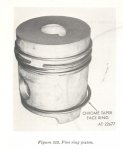rustystud
Well-known member
- 9,361
- 3,262
- 113
- Location
- Woodinville, Washington
So you have never seen any problems from a manufacturer ? If there is a "run" that got messed up then Yes it is possible. I'm just throwing out possibilities, and until this engine is disassembled we will not know. But you should always check your parts because you never know unless your Gerhard !I suppose these are the piston/sleeve kits in question, and that they all came in their original box, all nicely wrapped and still sealed in plastic?
Of course I could go and open all of mine and measure, but I know beforehand what the results will be...
Still, for peace of mind I might check the only one I had cut open so far, to take those pics.
It's hard to believe that all 6 of the OP's pistons/rings were too small. Or that no-one else has reported similar symptoms like low compression and excess blow-by, if these kits were somehow problematic.
G.
I forgot to mention all the "factory" recalls of literally hundreds of thousands of defective parts from ALL the auto manufacturers. If you want to believe just because the part is Nicely wrapped that it is OK well then I have some property in Iraq that is a real bargain right now !
Last edited:


